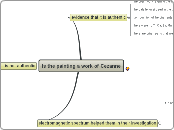Is the painting a work of Cezanne
evidence that it is not authentic
binder based on an animal glue was widely used in the late ninteenth century until the 1940s
the painting has underdrawing which is unusual in the Cezanne paintings
UV states that it is not likely to be a hundred years old
electromagnetic spectrum helped them in their investigation
importance
detect the bright parts in the paintig
the tools that were used
the composition of the pigments
detect are any underdrawings
how old is the painting
it is a wide range of light that have different frequencies including
IR
detect anomalies beneath the painting. It also indicate a particular functional group of amino acids.
Visible light
X-ray
excites element's inner electrons. they emit x-ray frequencies of that specific element when they de-excite
UV
examining fiuorescence from the surface of the painting.full emission of spectrum can be collected from any area of the painting only from the top 50 microns
evidence that it is authentic
there are bright parts that are seen in another Cezanne paintings
there were no Ti, Ca, Ba, Mn in the painting which were not available until 1920s and 1930s
composition of the pigments returns for the period between 1839-1906
the palette knief used in the painting was characterized for Cezanne
the brushwork return to the 1800s

